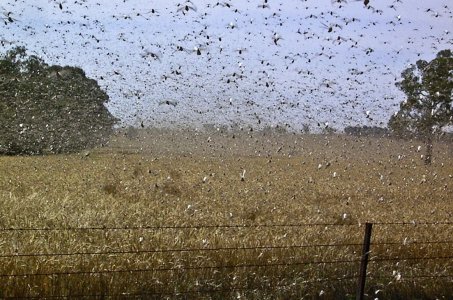Massive invasion spreads across Australia and what you need to know
By
- Replies 3
As the environment faces a potential challenge, residents in certain areas are urged to act against a growing threat.
Experts warn of a rising insect outbreak risk that could impact local ecosystems and agriculture.
Some regions are particularly vulnerable, with authorities closely monitoring the situation.
The Central West Local Land Services call on the public to proactively prevent this potential disaster.
They advised residents to inspect 'bare, compact soil' and 'hard, well-drained ground along contour banks or open areas' for locust eggs.
If any signs of locust activity are spotted, it's crucial to alert the authorities immediately.
Andy Austin, an entomologist from Adelaide University, describes the experience of witnessing a locust swarm as 'remarkable, yet disturbing.'
He emphasised the importance of early intervention, stating, 'Females lay eggs into the ground, and when they emerge, they're in the nymphal stage—they look like little grasshoppers, but they don't have functional wings.
They stay in a concentrated area, and the key to controlling them is at this stage.'
Pesticides are the primary method to combat these pests, and timing is critical.
'Spraying them now at the beginning of the breeding cycle is best, not part way through,' Austin advised.
If not managed promptly, 'millions' of locusts can overrun an area, causing extensive damage.
The locusts' impressive reproductive capabilities and potential for long-distance travel make them a formidable invasive species.
Once they reach adulthood, locusts can travel significant distances, from tens to hundreds of kilometres, stripping vegetation and depriving livestock of food.
The damage they can inflict on the environment and agriculture is substantial and often devastating.
Australia is home to three species of pest locusts, including the native Australian plague locust.
The country has experienced eight major locust plagues since 1930, with historical accounts of outbreaks dating back centuries.
The biblical connotations of locust swarms as divine wrath underscore the severity of their impact on human livelihoods.
The quiet catastrophe unfolding in the outback of Australia serves as a stark reminder of the consequences of invasive species.
As property owners and residents, it's imperative to remain informed and prepared to take action against these threats.
The 'world's worst' invasive species can cause irreversible damage to ecosystems and economies, and collective efforts are necessary to mitigate their spread.
For our readers at the Seniors Discount Club, we encourage you to stay informed about the latest pest control developments and participate in community efforts to monitor and report locust activity.
Your vigilance can make a significant difference in protecting our cherished Australian landscape.
In other news, a resident captured a striking sight as thousands of beetles swarmed during a mating event in a local park.
Experts reassure that these insects are harmless to humans and play a vital role in the ecosystem by aiding pollination and controlling pests. You can read more about it here.
 Do you have any tips or experiences dealing with locusts or other invasive pests? Share your stories with us, and let's work together to safeguard our homes and environment from these unwelcome invaders.
Do you have any tips or experiences dealing with locusts or other invasive pests? Share your stories with us, and let's work together to safeguard our homes and environment from these unwelcome invaders.
Experts warn of a rising insect outbreak risk that could impact local ecosystems and agriculture.
Some regions are particularly vulnerable, with authorities closely monitoring the situation.
The Central West Local Land Services call on the public to proactively prevent this potential disaster.
They advised residents to inspect 'bare, compact soil' and 'hard, well-drained ground along contour banks or open areas' for locust eggs.
If any signs of locust activity are spotted, it's crucial to alert the authorities immediately.
Andy Austin, an entomologist from Adelaide University, describes the experience of witnessing a locust swarm as 'remarkable, yet disturbing.'
He emphasised the importance of early intervention, stating, 'Females lay eggs into the ground, and when they emerge, they're in the nymphal stage—they look like little grasshoppers, but they don't have functional wings.
They stay in a concentrated area, and the key to controlling them is at this stage.'
Pesticides are the primary method to combat these pests, and timing is critical.
'Spraying them now at the beginning of the breeding cycle is best, not part way through,' Austin advised.
If not managed promptly, 'millions' of locusts can overrun an area, causing extensive damage.
The locusts' impressive reproductive capabilities and potential for long-distance travel make them a formidable invasive species.
Once they reach adulthood, locusts can travel significant distances, from tens to hundreds of kilometres, stripping vegetation and depriving livestock of food.
The damage they can inflict on the environment and agriculture is substantial and often devastating.
Australia is home to three species of pest locusts, including the native Australian plague locust.
The country has experienced eight major locust plagues since 1930, with historical accounts of outbreaks dating back centuries.
The biblical connotations of locust swarms as divine wrath underscore the severity of their impact on human livelihoods.
The quiet catastrophe unfolding in the outback of Australia serves as a stark reminder of the consequences of invasive species.
As property owners and residents, it's imperative to remain informed and prepared to take action against these threats.
The 'world's worst' invasive species can cause irreversible damage to ecosystems and economies, and collective efforts are necessary to mitigate their spread.
For our readers at the Seniors Discount Club, we encourage you to stay informed about the latest pest control developments and participate in community efforts to monitor and report locust activity.
Your vigilance can make a significant difference in protecting our cherished Australian landscape.
In other news, a resident captured a striking sight as thousands of beetles swarmed during a mating event in a local park.
Experts reassure that these insects are harmless to humans and play a vital role in the ecosystem by aiding pollination and controlling pests. You can read more about it here.
Key Takeaways
- Locust swarms are posing a significant threat in parts of New South Wales, Australia, with the potential to reproduce and cause extensive damage rapidly.
- Authorities are urging residents, especially in the central west of NSW, to monitor for locust eggs and report any findings to help prevent an outbreak.
- Entomologist Andy Austin emphasised the importance of early intervention, recommending spraying pesticide at the nymphal stage at the start of the breeding cycle to control the locust population.
- Australia has a history of locust outbreaks with various species, including the native Australian plague locust, and such events can have catastrophic impacts on agriculture and livestock by stripping vegetation.








